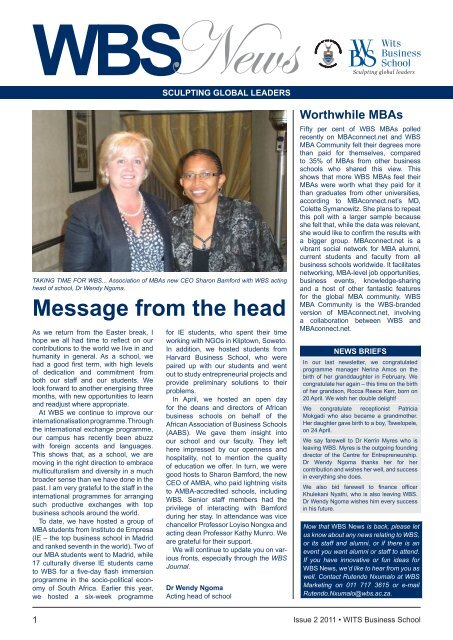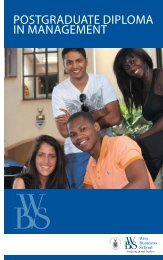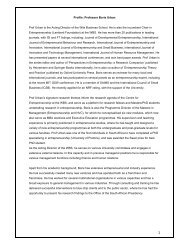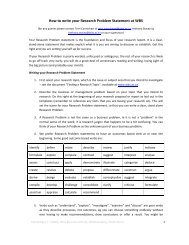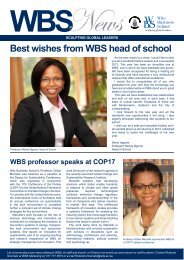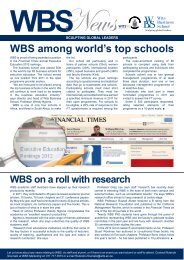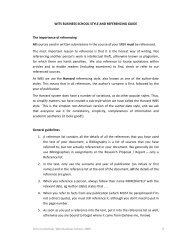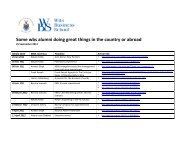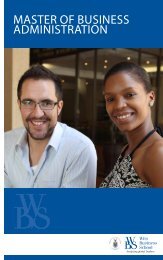News - Wits Business School
News - Wits Business School
News - Wits Business School
Create successful ePaper yourself
Turn your PDF publications into a flip-book with our unique Google optimized e-Paper software.
WBS<strong>News</strong><br />
SCULPTING GLOBAL LEADERS<br />
TAKING TIME FOR WBS... Association of MBAs new CEO Sharon Bamford with WBS acting<br />
head of school, Dr Wendy Ngoma.<br />
Message from the head<br />
As we return from the Easter break, I<br />
hope we all had time to reflect on our<br />
contributions to the world we live in and<br />
humanity in general. As a school, we<br />
had a good first term, with high levels<br />
of dedication and commitment from<br />
both our staff and our students. We<br />
look forward to another energising three<br />
months, with new opportunities to learn<br />
and readjust where appropriate.<br />
At WBS we continue to improve our<br />
internationalisation programme. Through<br />
the international exchange programme,<br />
our campus has recently been abuzz<br />
with foreign accents and languages.<br />
This shows that, as a school, we are<br />
moving in the right direction to embrace<br />
multiculturalism and diversity in a much<br />
broader sense than we have done in the<br />
past. I am very grateful to the staff in the<br />
international programmes for arranging<br />
such productive exchanges with top<br />
business schools around the world.<br />
To date, we have hosted a group of<br />
MBA students from Instituto de Empresa<br />
(IE – the top business school in Madrid<br />
and ranked seventh in the world). Two of<br />
our MBA students went to Madrid, while<br />
17 culturally diverse IE students came<br />
to WBS for a five-day flash immersion<br />
programme in the socio-political economy<br />
of South Africa. Earlier this year,<br />
we hosted a six-week programme<br />
for IE students, who spent their time<br />
working with NGOs in Kliptown, Soweto.<br />
In addition, we hosted students from<br />
Harvard <strong>Business</strong> <strong>School</strong>, who were<br />
paired up with our students and went<br />
out to study entrepreneurial projects and<br />
provide preliminary solutions to their<br />
problems.<br />
In April, we hosted an open day<br />
for the deans and directors of African<br />
business schools on behalf of the<br />
African Association of <strong>Business</strong> <strong>School</strong>s<br />
(AABS). We gave them insight into<br />
our school and our faculty. They left<br />
here impressed by our openness and<br />
hospitality, not to mention the quality<br />
of education we offer. In turn, we were<br />
good hosts to Sharon Bamford, the new<br />
CEO of AMBA, who paid lightning visits<br />
to AMBA-accredited schools, including<br />
WBS. Senior staff members had the<br />
privilege of interacting with Bamford<br />
during her stay. In attendance was vice<br />
chancellor Professor Loyiso Nongxa and<br />
acting dean Professor Kathy Munro. We<br />
are grateful for their support.<br />
We will continue to update you on various<br />
fronts, especially through the WBS<br />
Journal.<br />
Dr Wendy Ngoma<br />
Acting head of school<br />
Worthwhile MBAs<br />
Fifty per cent of WBS MBAs polled<br />
recently on MBAconnect.net and WBS<br />
MBA Community felt their degrees more<br />
than paid for themselves, compared<br />
to 35% of MBAs from other business<br />
schools who shared this view. This<br />
shows that more WBS MBAs feel their<br />
MBAs were worth what they paid for it<br />
than graduates from other universities,<br />
according to MBAconnect.net’s MD,<br />
Colette Symanowitz. She plans to repeat<br />
this poll with a larger sample because<br />
she felt that, while the data was relevant,<br />
she would like to confirm the results with<br />
a bigger group. MBAconnect.net is a<br />
vibrant social network for MBA alumni,<br />
current students and faculty from all<br />
business schools worldwide. It facilitates<br />
networking, MBA-level job opportunities,<br />
business events, knowledge-sharing<br />
and a host of other fantastic features<br />
for the global MBA community. WBS<br />
MBA Community is the WBS-branded<br />
version of MBAconnect.net, involving<br />
a collaboration between WBS and<br />
MBAconnect.net.<br />
NEWS BRIEFS<br />
In our last newsletter, we congratulated<br />
programme manager Nerina Amos on the<br />
birth of her granddaughter in February. We<br />
congratulate her again – this time on the birth<br />
of her grandson, Rocca Reece Kerr, born on<br />
20 April. We wish her double delight!<br />
We congratulate receptionist Patricia<br />
Mokgadi who also became a grandmother.<br />
Her daughter gave birth to a boy, Tswelopele,<br />
on 24 April.<br />
We say farewell to Dr Kerrin Myres who is<br />
leaving WBS. Myres is the outgoing founding<br />
director of the Centre for Entrepreneurship.<br />
Dr Wendy Ngoma thanks her for her<br />
contribution and wishes her well, and success<br />
in everything she does.<br />
We also bid farewell to finance officer<br />
Khulekani Nyathi, who is also leaving WBS.<br />
Dr Wendy Ngoma wishes him every success<br />
in his future.<br />
Now that WBS <strong>News</strong> is back, please let<br />
us know about any news relating to WBS,<br />
or its staff and alumni, or if there is an<br />
event you want alumni or staff to attend.<br />
If you have innovative or fun ideas for<br />
WBS <strong>News</strong>, we’d like to hear from you as<br />
well. Contact Rutendo Nxumalo at WBS<br />
Marketing on 011 717 3615 or e-mail<br />
Rutendo.Nxumalo@wbs.ac.za.<br />
1 Issue 2 2011 • WITS <strong>Business</strong> <strong>School</strong>
Reinventing<br />
entrepreneurship<br />
South Africa – like other developing<br />
countries – shows clear signs that<br />
an entrepreneurship market is ready<br />
to bloom and opportunities for small<br />
enterprises are everywhere, according<br />
to the WBS Chair in Entrepreneurship,<br />
Professor Boris Urban (PhD). In his<br />
inaugural lecture on 13 April, Urban<br />
explained that to promote this, the<br />
government and policymakers should<br />
“unleash rather than harness people’s<br />
entrepreneurial energies”.<br />
Urban, who is also the director<br />
of the Master of Management in<br />
Entrepreneurship and New Venture<br />
Creation programme, said it is not enough<br />
for the government to supply funds for<br />
start-ups and expect entrepreneurs to<br />
grow and flourish.<br />
“They should observe which<br />
direction entrepreneurs take and ‘pave<br />
the footpath’ by gently encouraging<br />
supportive economic activity to form<br />
around already successful ventures,<br />
rather than planning new sidewalks,<br />
pouring the concrete and keeping the<br />
entrepreneurs off the grass.”<br />
Urban is certain that, should the<br />
government play its cards correctly, this<br />
market would flourish. But as entrepreneurship<br />
is politically popular and often<br />
invoked as “a panacea to unemployment<br />
and economic growth issues”, Urban<br />
cautioned against “unreasonable and<br />
unpredictable expectations” without<br />
sufficient knowledge about what makes<br />
it work.<br />
He said while there are many<br />
resources supporting entrepreneurial<br />
activity within countries like South<br />
Africa, “it is very concerning that neither<br />
government-sponsored policies nor their<br />
programmes are considered effective.”<br />
“Currently the government is too keen<br />
to tie entrepreneurial activity to its own<br />
programmes of social justice, black<br />
economic empowerment and service<br />
delivery,” Urban said. “Subsequently,<br />
entrepreneurship gets a lot of obstruction<br />
and a little help from government, even<br />
though government policy claims to<br />
be supporting entrepreneurship.” It is<br />
also conceptualised within a welfare<br />
economic framework to make the poor<br />
less poor, rather than as a social utility<br />
in itself creating wealth.<br />
Urban believes that under these<br />
conditions, “entrepreneurship needs<br />
to be reinvented.” If the unique nature<br />
of individuals in unique circumstances,<br />
undertaking unique activities to start<br />
unique businesses is acknowledged,<br />
Urban explained, entrepreneurship can<br />
be reconfigured to suit an emerging<br />
market context. He added that state<br />
intervention needs to be translated into<br />
a mechanism to ensure the emergence<br />
and sustainability of entrepreneurship.<br />
“One way of creating a dynamic<br />
dominant logic is to make entrepreneurship<br />
the basis upon which the<br />
economy is conceptualised,” Urban said.<br />
In the running<br />
Aubrey Sithole joined <strong>Wits</strong> <strong>Business</strong><br />
<strong>School</strong> two years ago as a handyman<br />
and, although he enjoys his job, there<br />
is something he enjoys even more –<br />
running. Sithole has been running long<br />
distance since childhood and has been<br />
winning medals for it since primary<br />
school.<br />
When a faculty member asked Sithole<br />
at the beginning of 2010 what he wanted<br />
to achieve in life, Sithole said he wanted<br />
to be a runner. A call was made to the<br />
Nedbank Running Club and Sithole<br />
joined in March 2010. Another staff<br />
member helped him with money for<br />
shorts, vests and other necessities for<br />
his sport. In November, he ran his first<br />
marathon – the Soweto Marathon – and<br />
finished 26th out of 18 000 runners.<br />
“I told myself running is my talent,” he<br />
says.<br />
Sithole is training for the Comrades<br />
Marathon with Orlando Athletics Club,<br />
having changed clubs for logistical<br />
reasons. At present, he clocks roughly<br />
250 km a week. “Every day before work,<br />
I run 10km and after work I do 20 more.”<br />
On weekends, he can run up to 100 km.<br />
When asked what he liked about the<br />
sport, Sithole’s answer was simple and<br />
honest: “I enjoy it... too much.”<br />
2 Issue 2 2011 • WITS <strong>Business</strong> <strong>School</strong>
Myths about women<br />
entrepreneurs<br />
Around 38% of businesses in<br />
South Africa are women-owned<br />
and more than 25% of them make<br />
in excess of R750 000 a year.<br />
This is according to the research<br />
into female entrepreneurs in<br />
South Africa done by Dr Kerrin<br />
Myres at the WBS Centre for<br />
Entrepreneurship.<br />
Myres’ research, which dispelled<br />
many of the popular myths around<br />
women entrepreneurs, was a joint<br />
venture between WBS and First<br />
National Bank.<br />
At the launch of the study, Kirsty Davis, FNB <strong>Business</strong><br />
Banking CEO, said: “It is really interesting because it does show<br />
that all business owners face certain challenges – but women,<br />
because of their gender, often have additional obstacles to<br />
those experienced by their male peers.<br />
“The research was mainly to provide an understanding<br />
of the needs, challenges and concerns faced by female<br />
entrepreneurs.”<br />
Myres debunks the myth that women start businesses as<br />
a hobby to generate extra income while they take care of<br />
the kids. “Nothing could be further from the truth,” she says.<br />
“Myths like that can be very destructive and they undermine<br />
the seriousness of businesses run by women that are really<br />
contributing to the economy and employment.”<br />
The truth behind that myth is that most women start<br />
companies to keep learning and growing, to have greater<br />
flexibility, to be their own boss and to improve their personal<br />
income. They are motivated mostly by helping others, making<br />
a difference and by solving community problems.<br />
Myres found that very few women use financial services<br />
to help them fund their businesses. They mostly go the bootstrapping<br />
route or try and find an investor.<br />
Myres explained that this was a pilot study and the<br />
beginning of a programme that will continue to track women<br />
entrepreneurs.<br />
(Read <strong>Wits</strong> <strong>Business</strong> <strong>School</strong> Journal for the full story.)<br />
WBS wins top case-study<br />
competition<br />
WBS took first place in the Emerald Group Publishing and<br />
Association of African <strong>Business</strong> <strong>School</strong>s 2011 competition for<br />
a case study on Woolworths’ sustainability, written by Amanda<br />
Bowen and Professor John Luiz.<br />
The case, titled ‘Woolworths SA: making sustainability<br />
sustainable’ draws on the success of Woolworths and the<br />
measures the corporate has implemented to improve its<br />
sustainability performance.<br />
It illustrates a number of important issues around sustainability,<br />
such as that there is increasing pressure on businesses<br />
to adopt the principles of sustainable development but few<br />
realise it can enhance profitability. The study finds that<br />
implementing sustainable development requires an alternative<br />
business journey and it is vital that companies bring their<br />
customers, suppliers and investors onboard.<br />
“WBS is honoured to have won this prestigious competition.<br />
This reiterates the international standard of work that is produced<br />
at WBS,” says Luiz, director of international programmes at<br />
WBS. The WBS Case Study Centre which coordinates, creates<br />
and writes all case studies for the school, is unique, and WBS<br />
is the only school that has its own dedicated case centre where<br />
case studies are documented on examples of local businesses’<br />
success and failures.<br />
UPCOMING EVENTS<br />
14 MAY 2011 – WBS MBA Open Day is the perfect event to attend<br />
if you are considering doing your MBA, but need some questions<br />
answered first. Also, should you need any information on WBS short<br />
courses, don’t miss this. The open day is from 9am to 3pm. Contact<br />
Roland Viedge on 011 717 3615 or roland.viedge@wits.ac.za.<br />
19 MAY 2011 – WBSA Speed Networking Evening is a chance to<br />
expand your professional network and meet old friends. It will be<br />
held at WBS at 5.30pm for 6pm, until 8pm. Entry R100. Numbers<br />
limited. To book, contact Debbie Sachs on 011 717 3637 or debbie.<br />
sachs@wits.ac.za.<br />
27 MAY 2011 – Maria Ramos will speak about ‘The BRICS<br />
opportunity: what this means for South Africa and for doing business<br />
on the continent of Africa’ at a <strong>Wits</strong> and WBS Alumni breakfast from<br />
7am to 9.15am. R150 per person. Contact Purvi Purohit on purvi.<br />
purohit@wits.ac.za for details.<br />
AFRICAN DEANS VISIT...Deans/directors of schools as far afield as Nigeria, Egypt, Senegal and Tanzania spent a day (12 April) at WBS. Pictured<br />
above are the 19 deans and WBS staff.<br />
3 Issue 2 2011 • WITS <strong>Business</strong> <strong>School</strong>
WBS short courses<br />
SENIOR EXECUTIVE PROGRAMMES<br />
WBS International Executive Development Programme<br />
(IEDP) (including international study tour)<br />
11 August–11 September 2011<br />
Contact Faith Koroloso on 011 717 3569<br />
Strategic Leadership<br />
GENERAL MANAGEMENT<br />
19–21 September 2011 (JHB)<br />
Managing a Turnaround and Corporate Renewal<br />
23–27 May 2011 (JHB)<br />
The Art and Science of Negotiation<br />
24–27 May 2011 (JHB)<br />
Corporate Governance<br />
30 May–2 June 2011 (JHB)<br />
The Art and Science of Negotiation<br />
16–19 August 2011 (JHB)<br />
Thinking and Planning Strategically<br />
22–25 August 2011 (JHB)<br />
SPECIALISED TOPICS<br />
BBBEE – Unpacking Strategy and Codes<br />
25–26 May & 22 June 2011 (JHB)<br />
17–18 August & 15 September 2011 (JHB)<br />
Project Management<br />
20–24 June 2011 (JHB)<br />
14–18 November 2011 (JHB)<br />
Climate Change and Carbon Markets Management<br />
Development Programme<br />
15–19 August 2011 (JHB)<br />
Management Consulting Skills<br />
25–27 July 2011 (JHB)<br />
CERTIFICATE PROGRAMMES<br />
Management Advancement Programme<br />
15 July–19 November 2011 (JHB) (Weekend block<br />
release)<br />
9 September 2011–20 May 2012 (JHB) (Part time)<br />
Certificate Programme in Finance and Accounting<br />
4 July–23 November 2011 (JHB)<br />
FINANCE<br />
Finance for Non-financial Managers<br />
27 June–1 July 2011 (JHB)<br />
22–26 August 2011 (JHB)<br />
Technical and Financial Evaluation in Mineral Projects<br />
19–23 September 2011<br />
Integrating Strategy, Budgeting and Reporting<br />
3–5 October 2011 (JHB) (Private sector)<br />
24–26 October 2011 (JHB) (Public sector)<br />
MARKETING<br />
Product Strategy and Brand Management<br />
10–12 August 2011 (JHB)<br />
Marketing Management Programme<br />
19–21 May & 23–24 June 2011 (JHB)<br />
Sales Management<br />
11–15 July 2011 (JHB)<br />
Strategic Marketing Management<br />
25–29 July 2011 (JHB)<br />
LEADERSHIP DEVELOPMENT CENTRE<br />
PROGRAMMES<br />
Certificate Programme in Leadership Development<br />
(CPLD) 2<br />
20 June–2 December 2011 (JHB) (Six block releases)<br />
CERTIFICATE PROGRAMMES<br />
New Managers Programme<br />
23 May–26 August 2011 (JHB)<br />
11 July–14 October 2011 (JHB)<br />
19 September–9 December 2011 (JHB)<br />
Certificate Programme in Marketing Management<br />
21 May–19 September 2011 (JHB)<br />
Certificate Programme in <strong>Business</strong> Project<br />
Management<br />
23 May–11 November 2011 (JHB)<br />
CONTACT DETAILS:<br />
Mankosana Mngomezulu<br />
Tel: 011 717 3778<br />
E-mail: mankosana.mngomezulu@wits.ac.za<br />
4 Issue 2 2011 • WITS <strong>Business</strong> <strong>School</strong>


